Jose Angel Araguz's Blog, page 5
May 10, 2023
virtual event, redo
Hi all! Just a quick post to share that we are doing a redo of last month’s virtual event which was interrupted by Zoom bombing, oof. Here’s the info:
WHAT: Suffolk University English Dept. presents: A Poetry Celebration virtual event featuring Rooja Mohassessy & Adeeba Shahid Talukder
WHEN: Thursday, May 18th 2023 @ 6PM EDT
WHERE: This event will take place virtually on Zoom. Registration required.
REGISTRATION (ONLINE): Use this link to register to attend virtually.
Join us for a wonderful night of poetry featuring Rooja Mohassessy & Adeeba Shahid Talukder. Mohassessy’s work is new to me, a wonderful addition to my daily reading. Find out more about her on her site. I’ve had the opportunity to feature Talukder’s work on more than one occasion, like here and here. I’m also to have Suffolk’s very own student poet, Hanan Tuffaha, read an opening poem as well!
Do consider coming out next week and supporting these amazing poets!!!

April 20, 2023
National Poetry Month virtual reading!
Excited to share that I will be hosting a virtual event for Suffolk University in celebration of National Poetry Month THIS SATURDAY!

WHAT: Suffolk University National Poetry Month virtual event featuring Rooja Mohassessy & Adeeba Shahid Talukder
WHEN: Saturday, April 22nd, 2023 @ 6PM EST
WHERE: This event will take place virtually on Zoom. Registration required.
REGISTRATION (ONLINE): Use this link to register to attend virtually.
Join us for a wonderful night of poetry featuring Rooja Mohassessy & Adeeba Shahid Talukder. Mohassessy’s work is new to me, a wonderful addition to my daily reading. Find out more about her on her site. I’ve had the opportunity to feature Talukder’s work on more than one occasion, like here and here. I’m also to have Suffolk’s very own student poet, Hanan Tuffaha, read an opening poem as well!
Been behind on my reviews, apologies. More soon. In the meantime, I encourage you to join us this weekend 
Abrazos,
José
March 16, 2023
microreview: La Movida by Tatiana Luboviski-Acosta
review by José Angel Araguz
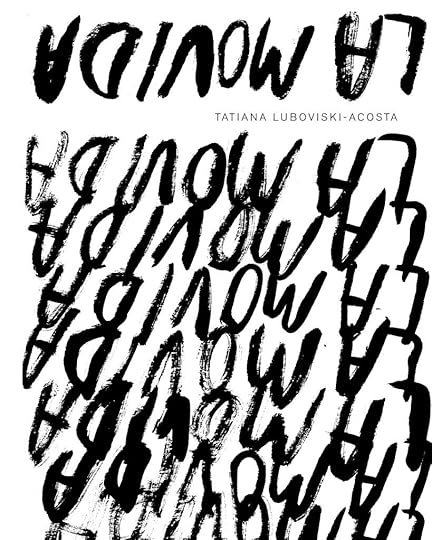
In my research (read: Googling) as I spent time with La Movida by Tatiana Luboviski-Acosta (Nightboat Books) I came across the following lines shared by more than one Tumblr account:
There’s a weapon I wish
I could wield
when I feel the vomit of your gaze
hit the side of my face.
I want an education
in remembering
and I want an education
in forgetting.
I fast until the basket is done,
throw my maidenhead into the trash,
and relish the solidarity
of absolute feminine horror.
These lines come from the poem “Men Who Cannot Love” and serve as a solid example of Luboviski-Acosta’s poetic sensibility throughout this collection. The direct engagement with metaphor juxtaposed with the pathos of the speaker’s voice here make for an immediate and visceral reading experience.
And yet, for the dynamic flex of technique, the lines–here and elsewhere in this collection–feel relatable, biting but not bitter. I would call this a bright emotional range: bright meaning joyful but also illuminating, like flame. Just the kind of thing to share across the glowing screens of social media, a glow sought out for the intimacy it promises.
In an interview, Luboviski-Acosta calls this a collection of love poems, and to a refreshing extent this is true. These poems call out for love and enact it through linguistically surprising phrasing and an ability to draw out a range of tones from raw, honest meditations.
This love, however, comes not without an awareness of what one risks in loving. There are times in these poems where the very language breaks. In “Saw You in My Nightmares / See You in My Dreams”, for example, we have a number of lines that break a word in half (e.g. “wan / der,” “thou / sand”).
These moves force the eye to simultaneously halt while also be urged on by this word-break: halted on a number of possible meanings, and urged on to the meaning of the moment (the moment colored by the break). It is in these cracked words and the flux and urgency created that one feels briefly the cost and the joy of the kinds of love Luboviski-Acosta is celebrating here.
While the title phrase has political connotations — and Luboviski-Acosta is indeed creating feminist and punk liberatory spaces in these poems — I couldn’t help but think of how I knew the phrase growing up. “La movida” is what my tia would tease me about, encouraging me to make a move on whatever woman I talked with on the phone as a teen. This brief anecdote has its problematic tone to interrogate: while my tia may have encouraged me because I was a boy, were I a girl she would be warning against boys like me trying to dar la movida.
This conflicting albeit toxic-heteronormative take on the title feels like something Luboviski-Acosta would have readers engage with, especially in light of the the title poem itself, which also closes the book.
In this poem, the speaker engages in a breathless direct address to another person that ranges from casual flirting to an all-out cosmic declaration of love. As the poem develops, the speaker makes their move, so to speak, in lines that ring across the dance floor with clear, lyric vibrancy.
*
La Movida can be purchased from Nightboat Books.
Also, here’s the dynamic interview mentioned above where Tatiana Luboviski-Acosta discusses this collection.
Lastly, check out the opening poem as well for a further treat.
February 22, 2023
microreview: like everything else we loved by sarah a. chavez
review by José Angel Araguz
 A copy of the micro chapbook like everything else we loved by Sarah A. Chavez framed by flowers.
A copy of the micro chapbook like everything else we loved by Sarah A. Chavez framed by flowers.Early on in like everything else we loved by Sarah A. Chavez, a micro chapbook published by Porkbelly Press, the reader is presented a scene in which the speaker describes a hole where the city has uprooted a tree as follows:
Like losing you, the loss of the tree
was quick. One day, diagnosis, next
dust from the wood chipper coated
the large hole in the grass
where the stump was pulled out.
Such a big hole. So big I could
sit in it, so I did, and ran my hand
along the edges of root
left connectionless beneath
the grassy surface. I put my tongue
to the limbs’ ashes, the saw dust
sticking to my shirt and pants.
This image of the speaker not only observing but dwelling on the dismantling and death of another, specifically of a tree, is legit enough. But the image of the speaker in the hole, physically present in the absence of the tree, serves as a metaphor for this project, underscoring grief as exploration marked and forged by persistent excavation of the self and of memory.
In this collection, Chavez adds to her series of “Dear Carole” poems that have become their own body of work within her larger body of work (which can be found across her full-length collections Hands That Break & Scar (Sundress Publications, 2017) and All Day, Talking (dancing girl press, 2014)). The poems of like everything else we loved are elegiac epistolary poems, poems that celebrate and hold space for the grief and love the speaker in them feels for Carole, and doing so through the direct address of a letter. Yet, it’s the poetic sensibility on display in these poems — a sensibility able to honor a lost loved one in a way that is intimate as well as accessible — that marks the accomplishment and gift they are to the elegiac and epistolary traditions.
The poem from which the image above comes from, for example, is entitled “Dear Carole, Dermatologists Call the Body a ‘Trunk’,” a title that in its word choice and phrasing invites us into the realm of gossip and daily life. There’s an urgency to this address, a sense of having found something out that only one other person will understand, accompanied by the need to share it. One feels you are overhearing two kindred spirits alive together through the fact of the poem.
While the epistolary form necessarily marks it as a one-sided conversation, the voice in this and other poems in the series takes its time meditating and speaking to Carole in empathetic, blunt, and candid ways. The result is a voice whose honesty is animate and grows before the reader. In this way, poetry creates a space of connection, of relating, of inside jokes and acknowledged flaws, and ultimately of mattering.
The image of the speaker in the hole is almost like they would press themselves into the Earth similarly as the writer presses the words onto the page. I think I keep coming back to this image because of how honest it feels. It’s the kind of thing you’d share with someone only if they mattered to you. In sharing with Carole in these poems, the speaker evokes for us the richness and depth of mattering.
*
like everything else we loved can be purchased from Porkbelly Press.
To check out more of Sarah A. Chavez’s work, check out her site.
Lastly, here’s a dynamic essay where Chavez breaks down her thoughts on “Working Class Poetry.”
February 10, 2023
dispatch 021023
Had the opportunity to share one of Paul Hlava Ceballos’ poems at a reading this week. The poem, “Coronary Angiogram,”* is a fascinating prose poem whose turns of phrase move between two different languages of the heart: the medical and the personal.
There’s also a nod to history and craft in the second stanza:
“At a museum in Quito I saw knots tied along lines of hand-woven silk. Beautiful and multi-colored the Quipus hung, perhaps the coded names of Inkas killed by Spanish, perhaps an art form, or both,”
This image of actual knots and weaving mirrors the weaving of languages that drive the poem. The most stunning moment for me, however, is how the speaker leaves us witnessing another kind of crafted piece, a stanza composed of vertical lines and asterisks.
At first, I was unsure what these represented. The typography here does resemble Quipus in a way, the notes and the threads. Upon listening to the poem at the link (highly encouraged), there’s an additional gift: the sound of windchimes.
 a close-up picture of a Quipu
a close-up picture of a QuipuWhichever is intended, this ending and its multi-modal layers make for a unique reading experience.
To check out more of Paul Hlava Ceballos’ work, check out his website.
*This poem was originally published in Iterant issue 9.
February 6, 2023
Grolier hybrid reading this Thursday!

Just a quick post to share that I’ll be doing a hybrid event this week!
WHAT: Grolier Poetry Book Shop presents José Angel Araguz & Levi Rubeck (hybrid reading)
WHEN: Thursday, February 9th, 2023
WHERE: This event will take place synchronously via Zoom and in
store at 6 Plympton Street. Registration is required.
REGISTRATION (ONLINE): Use this link to register to attend virtually.
REGISTRATION (IN-PERSON): Use this other link to register for an in-person ticket.
Super-excited to read at such a poetically historic venue!
Abrazos,
José
February 1, 2023
microreview: Year of the Murder Hornet by Tina Cane
review by José Angel Araguz
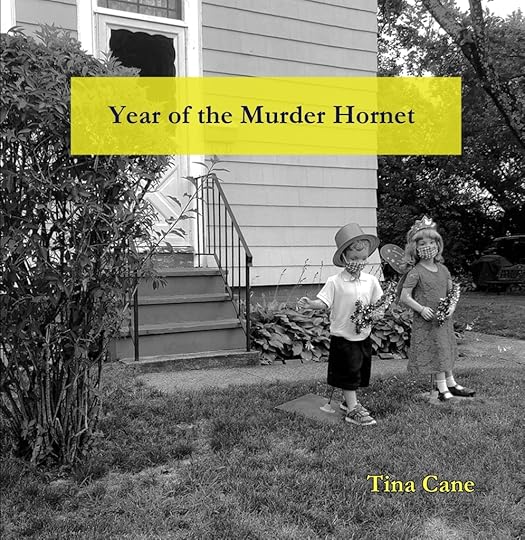
As the pandemic continues being an ongoing, consistent crisis killing 4,000 people a week in this country* — this despite the current administration’s plan to call an end to it as a health emergency — it feels more urgent than ever to honor and bring attention to work that lives up to poetry’s possibilities as archive of our present moment and lived experience.
Enter Tina Cane’s Year of the Murder Hornet (Veliz Books, 2022). This poetry collection is a dynamic enterprise. Cane’s distinct vision in this project is executed through poems and formal choices that reflect a disjointed, urgent reality.
The poem “Shelter in Place,” for example, begins:
Schools are shuttered everything is cancelled and my body has become
an extension of my house this shift is strange but not entirely unfamiliar
Here, Cane’s engagement with the pandemic as subject matter moves it from the headlines and statistics that framed our lives at the start of the pandemic and brings it into the house and the body. This choice to ground the poem in the “strange” aspects of the moment conveys how it is “not entirely unfamiliar.” The pandemic has us reassessing and rethinking our lives, from our societal understanding of the systemic oppression felt across class, race, sexuality, and ability to the way we live our day to day lives. “as the architects of our days,” the poem posits at the end, “[our] nature will continue to amaze us in ways we don’t expect.” This closing underscores the sense of autonomy troubled by the uncertainty we continue to live under.
Throughout my reading of Year of the Murder Hornet I kept marveling over Cane’s ability to linger over the spaces in between things. Specifically, the choice to include additional white space within the lines of each poem emphasizes both how stalled shifts in the pandemic can make us feel as well as how necessary it is to take our time. By take our time I mean in terms of reading the situation — whether it be assessing what the reality behind phrases like “the new normal” actually is like, to preparing (mentally, physically) for the changes brought on by decisions at our jobs or by the government which we have no say in.
The poems “Essay on Gentrification” and “Minority Report” also work in this vein and are good examples of how this collection takes its time interrogating the nuances of life during a pandemic, nuances that are often lost in debates and political discourse.
This collection also includes the sequence “What We Talk About When We Talk About Paths: A Narrative in Captions,” a deviation from the formal choices in the poems discussed so far (an excerpt can be read here). In the physical collection, this poem lives in the middle of the page, a rectangle path of words that catalogues captions from social media and brings them into a poetic space. This sequence is striking for the way it allows this list of captions to establish presence, a presence similar to what is achieved in our use of social media.
In the end, presence is what matters: that we are still here present, that we acknowledge, mourn, and celebrate those no longer physically present. This sense of mortality charges the edges of each poem in this collection as much as it influences the decisions of those in power. The gift that Tina Cane has given us in Year of the Murder Hornet is a sense of who we were, while the poems themselves remind us of who we are and could be.
*
Copies of Year of the Murder Hornet can be purchased from Veliz Books.
*For those looking for trustworthy, transparent information on the pandemic, I encourage y’all to check out the People’s CDC website.
January 12, 2023
dispatch 011223
Happy new year, y’all! The theme so far for 2023 seems to be difficulty: sometimes intense, sometimes fruitful, but always engaging.
Like a poem.
With this riff in mind, I’d like to give a shout-out to Sasha Pimental’s “If I Die in Juárez,” a poem that approaches difficult subject matter in an unexpected way.
Been approaching conversations about this poem in terms of it giving you a clue through the title’s specific city mention, Juárez, and then distancing away intentionally from its associations. This distancing is a risk that allows the imagery and language of violins to take on charged dual meanings as the poem develops.
[image error]Pexels.com" data-medium-file="https://thefridayinfluence.files.word..." data-large-file="https://thefridayinfluence.files.word..." src="https://thefridayinfluence.files.word..." alt="" class="wp-image-14947" width="167" height="250" srcset="https://thefridayinfluence.files.word... 167w, https://thefridayinfluence.files.word... 334w, https://thefridayinfluence.files.word... 100w, https://thefridayinfluence.files.word... 200w" sizes="(max-width: 167px) 100vw, 167px" />a violinThe opening lines, for example — “The violins in our home are emptied / of sound, strings stilled, missing / fingers.” — take on this work right away, with “emptied,” “missing,” and also “missing / fingers” taking on a stark set of meanings juxtaposed with the title.
On its own at the end of a line, “missing” invokes the ongoing history of femicide along the US / Mexico border. Then the latter “missing / fingers” rings out both in its evocation of a musician’s physical absence but also its implication of violence.
Even without knowledge of Juárez, one reaches the end of the poem with a haunted sense of something more than music being lost here. This haunted sense is what grounds the poem in its urgency. All the distancing through image and metaphor makes the city and its history all the more present, and offers the speaker a chance to voice the ultimate difficulty implied via the speculation of the title.
José
December 30, 2022
dispatch 123022
Whole lotta life keeps happening. It’s the main reason I’ve been quiet here. Like today, my partner has been out with a migraine for the greater part of the day, now evening, and I’ve been in the silence that comes with caregiving.
Well, the not-so-silent because my cat, Semilla, is here with me.
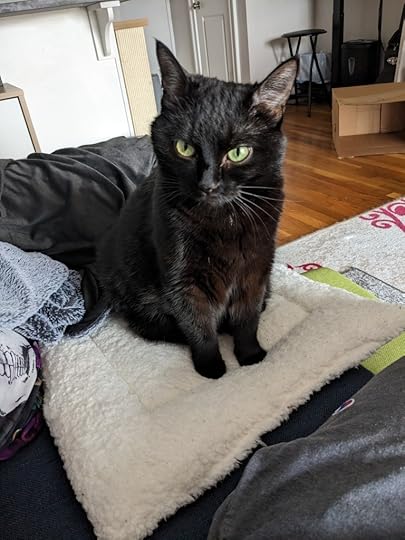 Semilla, a black cat, staring out into the camera.
Semilla, a black cat, staring out into the camera.I’d like to share some recent highlights and publications before the year is through:
I was excited to contribute a short write-up for Poets & Writer’s series “Writers Recommend.” I riff a bit about inspiration as well as shoutout the work of Karla Cornejo Villavicencio and Cristela Alonzo.On the Rotura (Black Lawrence Press) front, I am deeply honored to have the book reviewed recently. Thank you to Staci Halt who wrote this insightful review for The Los Angeles Review!Thank you also to Angela María Spring for including Rotura in their “10 New Poetry Collections by Latinx and Caribbean Writers” over at Electric Lit! Means a great deal to be included among such a powerful set of books.And looking ahead, I am excited to share in this space that my debut creative nonfiction collection, Ruin and Want, was chosen as the winning selection during Sundress Publications’ 2022 Prose Open Reading Period! This lyric memoir was a revelatory journey to write, both personally as well as craft-wise. I’m excited to have it find a home at such a great place!If you’re reading this, thank you for being here. It means a lot to share this space. I’ll be doing some new things next year on here. I also promise to get back to reviewing and sharing in this space in the coming year as it remains something that matters to me greatly.
In the meantime, take care of yourselves out there!
Abrazos,
José
November 24, 2022
dispatch 112422
 A blackout poem that reads “To take time and space is resistance.”
A blackout poem that reads “To take time and space is resistance.”Shared the above on my Instagram account @poetryamano on this the Day of Mourning with a note on taking care of one’s self during this time of the year. Whether it’s toxic family (here or elsewhere) or simply feeling left out of the big societal pressure that comes with national holidays, be kind to yourselves and take the time and space that is yours.
This week I’d like to give two celebratory shoutouts.
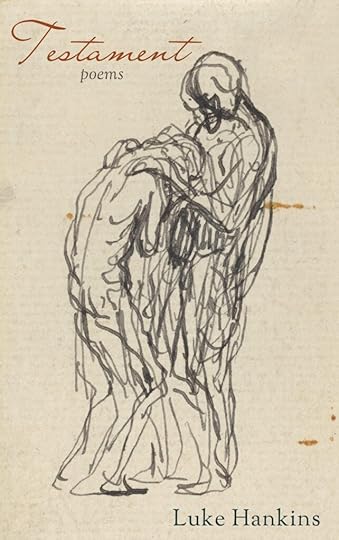 The cover for Testament by Luke Hankins.
The cover for Testament by Luke Hankins.First, I’d like to celebrate Luke Hankins’ new chapbook Testament (Texas Review Press) which is now available for pre-order. I had a chance to spend time with this collection early and wrote the following statement:
“Testament shows Luke Hankins deftly at work in a ‘small glory’ of a chapbook! Whether addressing the troubled country that is America or bringing the reader into the prayer-like intimacy of resonant daily moments, Hankins’s poems here create spaces of presence and awareness that are refreshing and which reward rereading. Testament evokes its title by speaking the facts of the self in such ways that we can join Hankins in loving ‘the broken world better / that has broken me.’”
(blurb for Testament by Luke Hankins)
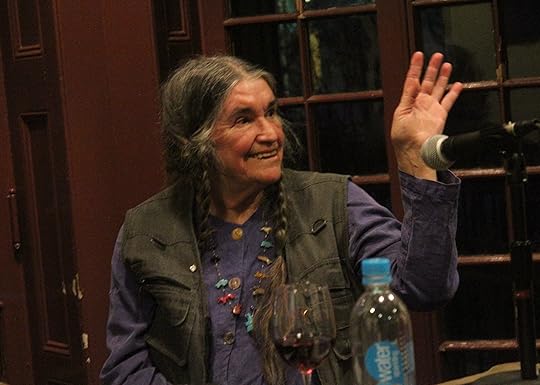 Bernadette Mayer sitting and waving before a microphone with a glass of wine and a water bottle.
Bernadette Mayer sitting and waving before a microphone with a glass of wine and a water bottle.My second note of celebration is for the recent loss to the poetry community of Bernadette Mayer. Check out her poem “The Way to Keep Going in Antarctica” and join me in being “strong” in the way such poets and poems show us to be.
More soon, fam.
José



